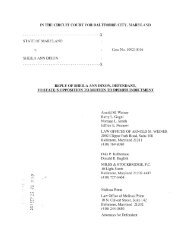Memorandum Opinion - the Circuit Court for Baltimore City
Memorandum Opinion - the Circuit Court for Baltimore City
Memorandum Opinion - the Circuit Court for Baltimore City
You also want an ePaper? Increase the reach of your titles
YUMPU automatically turns print PDFs into web optimized ePapers that Google loves.
Relying on Freetown v. Whiteman, 93 Md. App. 168 (1992), Rothstein and RAA also arguethat an attorney cannot conspire with a client in giving advice. As to <strong>the</strong> pleading, Rothsteinand RAA are correct – <strong>the</strong>re is no count on conspiracy and <strong>the</strong> defamation count is notalleged against <strong>the</strong>m. The <strong>Court</strong>, however, will address <strong>the</strong> issue none<strong>the</strong>less to circumventany request to amend <strong>the</strong> complaint.Rothstein and RAA’s reliance on Freetown is misplaced. That case makes clear thatan attorney may in fact conspire with a client. While acknowledging that “<strong>the</strong>re can be noconspiracy when an attorney acts within <strong>the</strong> scope of his employment,” 93 Md. App. at 234-35, <strong>the</strong> <strong>Court</strong> pointed out that an attorney may be liable <strong>for</strong> conspiracy where, “<strong>the</strong> attorneydid not act within <strong>the</strong> role of an advisor and merely advise, but instead knew of <strong>the</strong> client'swrongful conduct and was actively involved in <strong>the</strong> wrongful conduct.” Id. (citationsomitted). Thus, <strong>the</strong> fact that Rothstein and RAA are attorneys does not preclude anallegation of conspiracy.None<strong>the</strong>less, plaintiffs cannot satisfy <strong>the</strong> jurisdictional requirements of <strong>the</strong> conspiracy<strong>the</strong>ory of jurisdiction, <strong>the</strong> elements of which are:(1) two or more individuals conspire to do something(2) that <strong>the</strong>y could reasonably expect to lead to consequences ina particular <strong>for</strong>um, if(3) one co-conspirator commits overt acts in fur<strong>the</strong>rance of <strong>the</strong>conspiracy, and(4) those acts are of a type which, if committed by a nonresident,would subject <strong>the</strong> non-resident to personal jurisdictionunder <strong>the</strong> long-arm statute of <strong>the</strong> <strong>for</strong>um state, <strong>the</strong>n those overtacts are attributable to <strong>the</strong> o<strong>the</strong>r co-conspirators, who thusbecome subject to personal jurisdiction in <strong>the</strong> <strong>for</strong>um, even if<strong>the</strong>y have no direct contacts with <strong>the</strong> <strong>for</strong>um.Mackey, 391 Md. at 129 (citations and quotation omitted) (emphasis added). See also Fisherv. McCreary Crescent <strong>City</strong>, LLC, 186 Md. App. 86, 109 (2009).35
















